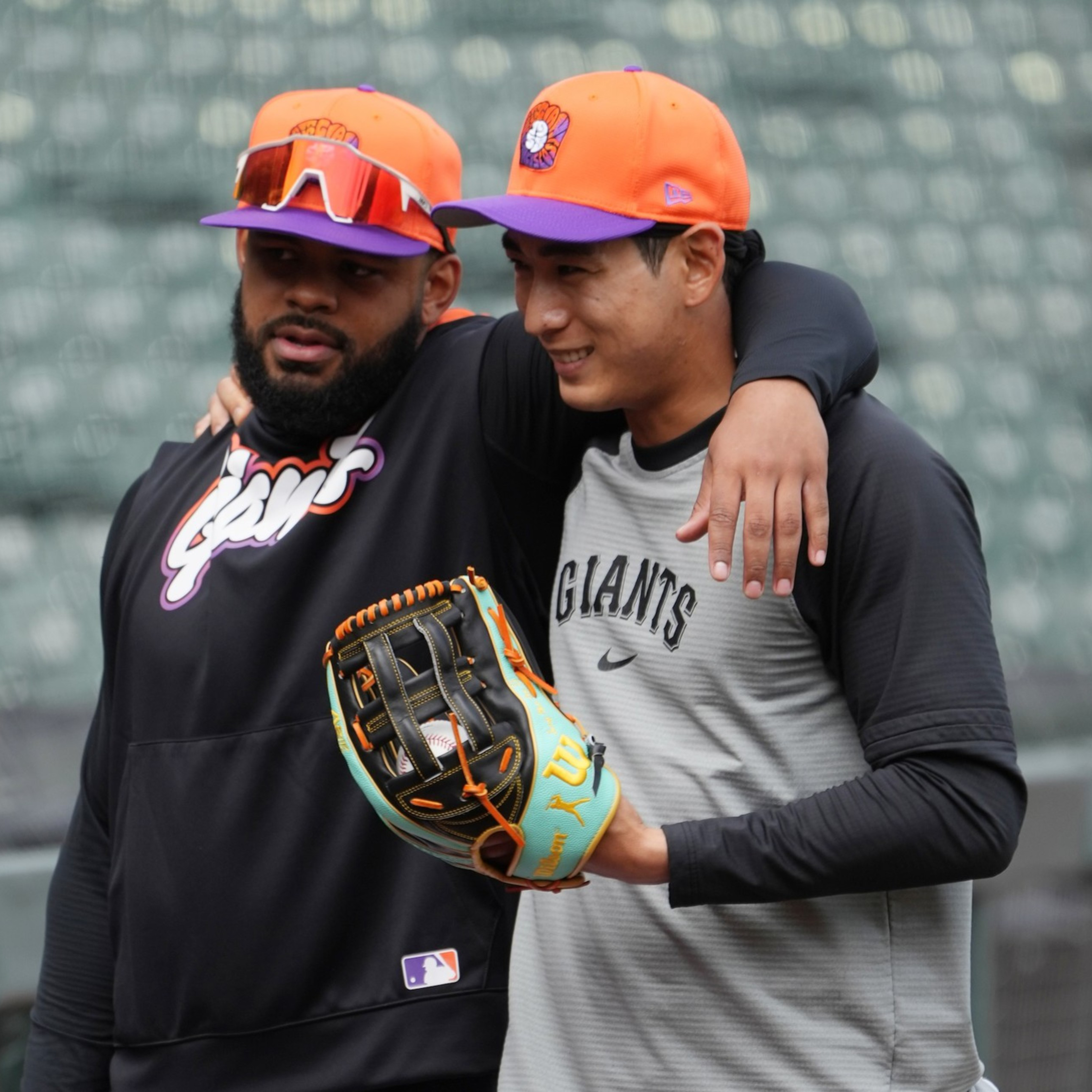Want the latest Bay Area sports news delivered to your inbox? Sign up here to receive regular email newsletters, including “The Dime.”
Two weeks after the San Francisco Giants made 17-year-old Heliot Ramos a millionaire in 2017, the baby-faced ballplayer sat inside the dugout at Oracle Park with cameras ready to capture every movement and microphones ready to record every word.
The Puerto Rican teenager, fresh off signing a contract that rewarded him with a $3.1 million bonus, couldn’t speak English and nearly froze. “I was scared,” Ramos recalled of that trip to China Basin. “I was scared that day.”
The Giants outfielder has come a long way since the team selected him out of Leadership Christian Academy in Guaynabo, a city of 4,000. These days, he’s not just a leadoff hitter and starting left fielder, he’s also a fluent English speaker who takes all interviews in his second language and serves as a translator in the outfield, relaying communications to center fielder Jung Hoo Lee, the Giants’ 27-year-old center fielder, who speaks Korean.
“I think he’s learning a lot, but it’s just a matter of him not being shy and just talking,” Ramos said of Lee. “But it’s hard. He’s from [South] Korea, learning a whole different language and pronunciation and all that.”
Section 415: How Natalie Nakase turned the Valkyries into an immediate force

Section 415: Tim Kawakami analyzes the 49ers, Giants, and Warriors

Section 415: Min Woo Lee, Steph Curry, and the story of The Bay Golf Club

Lee understands much of the baseball terminology used by English-speaking coaches but sometimes relies on Ramos to fill in the gaps.
“In the season, you just kind of naturally catch up with all of these words, because you listen to the same words every single day,” Lee said through Korean interpreter Justin Han. “But everything resets when you go back to Korea in the offseason and you don’t hear English for a couple of months.”

Ramos and Lee are two of the nine players on the Giants’ active roster who grew up speaking a language other than English. A few, such as Lee, conduct every interview using the assistance of a translator. Others, such as Rafael Devers, understand English well enough that they often don’t require questions to be translated but provide answers in Spanish, with the help of translator Erwin Higueros. Then there are players such as Ramos and Willy Adames, who are fully bilingual and handle each interview with American reporters in English.
The Giants haven’t had three foreign-born players appear in at least 100 games since Pablo Sandoval, Grégor Blanco, and Joaquín Arías in 2014. This year, they’ll have four — Ramos, Lee, Adames, and Wilmer Flores — with Devers just missing the cut after being traded from Boston in the middle of the season.
Adames signed with the Detroit Tigers out of the Dominican Republic at 16 and debuted in the U.S. two years later with the Western Michigan Whitecaps of the Midwest League. The shortstop barely knew any English when he arrived, leaving him lost on the field.
“I can’t just go to the field kind of blind without knowing what’s going on,” Adames said. “I needed to learn to know without having to rely on somebody else.”

Joel Peguero, a reliever from the Dominican Republic, said it was his everyday experiences away from the field that motivated him to start learning English.
“Sometimes you’re hungry, you want to go eat something, and that’s not easy,” said Peguero, who made his U.S. debut for a Tampa Bay Rays’ minor league affiliate in Princeton, West Virginia. “You have to ask in English.”
Like Ramos, Adames, and Peguero, Giants ace Logan Webb made his minor-league debut as a teenager. He enjoyed road trips to small towns around the country but knew how hard it was on peers who didn’t speak English.
“I took Spanish in high school,” Webb said. “I did all the classes, and I really couldn’t say a sentence in Spanish. So the fact that these guys can do an interview now, it’s really cool.”
Webb recalls his international teammates taking English classes three times per week in the minor leagues; others let American popular culture act as their teacher. Flores, a Venezuela native who is now bilingual, learned English watching “Friends.”
Studying TV is also how 23-year-old Luis Matos, who answers some questions in English and some in Spanish, picks up nuances that aren’t often taught in a classroom.
“When I’m at home, and I want to watch something in English, my wife wants to watch something in Spanish,” Matos said. “So for the most part, it’s usually when I’m on the road, on the plane, that’s when I watch my shows in English.”

Ramos is also a “Friends,” fan, and he recently added ‘The Steve Harvey Show” to his rotation of sitcoms.
The shows have helped Ramos master the English language. Now, he and Adames take pride in being able to translate for their teammates at the game’s most critical moments. If a Spanish-speaking pitcher needs assistance, Adames will jog in from shortstop. If Lee or Matos has a question in the outfield, Ramos will answer in terms they understand.
“We use a lot of cuss words,” he admitted.
The Giants’ bilingual players are so accustomed to speaking English on the diamond that sometimes they celebrate big moments or highlights by shouting, “Let’s fucking go!”
As for moments they’d rather forget?
“I feel like when I get mad, it’s in Spanish,” Adames said with a smile.

